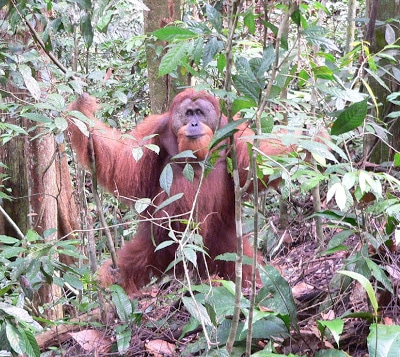
Wild adult male orangutan on Sumatra. Photo: Sally Kneidel
[See bottom of this page for list of my previous posts about orangutans.]
Most people are surprised to learn that unlawful traffic in wildlife and wildlife parts is the third biggest criminal activity in the world, after drugs and arms. The illegal hunting of great apes is so pervasive that it may threaten their survival even more than habitat loss does. Habitat loss is rampant these days, due to human population growth….so I wouldn't have believed that hunting could be an even bigger threat until reading a recent paper by Vincent Nijman (and 5 other scientists). Nijman is a scientist at Oxford Brookes University, a consultant to TRAFFIC, and has published numerous research papers on orangutan conservation. He and the other authors of this particular paper collected convincing data that suggest orangutan populations have been reduced more by hunting
I crisscrossed Indonesia and Malaysia looking for orangutans
I was on the islands Borneo and Sumatra a few months ago, searching high and low for wild orangutans. That was my main reason for going to Southeast Asia. I had researched sites carefully in advance and I chose my destinations accordingly; consequently, I was lucky enough to see a number of wild orangutans in undisturbed forests. But as Dr. Nijman writes, "Bornean orangutans currently occur at low densities and seeing a wild one is a rare event." In contrast, historic collectors like Alfred Russel Wallace in the 1800s saw many orangutans daily and "were able to shoot continuously over weeks or even months." Clearly, orangutans are much rarer today than they were in the past. That's true not only of orangutans, but also for the other great apes.
Chimpanzees and gorillas are hunted for meat
I saw on the "Planet Green" network on November 24 a one-hour documentary about an investigation into the hunting of chimpanzees and gorillas for bushmeat in Cameroon. The investigator, Steve Galster, said these two apes are popular meat because they're so big and fleshy relative to other remaining wildlife. The primary reasons they're shot or trapped is to eat them, to sell their meat to neighbors, or to transport the meat by train or car to city markets. But when baby animals are captured after shooting the mother, the babies can be shipped abroad to be sold as pets. So killing a mother ape is doubly profitable.
A pet chimp brings social status
I was impressed with the diligence of the filmmakers for this Planet Green show, which featured an undercover sleuth (a local woman) equipped with a tiny concealed camera visiting a local man who was trying to sell a baby chimp. The chimp was eventually confiscated





